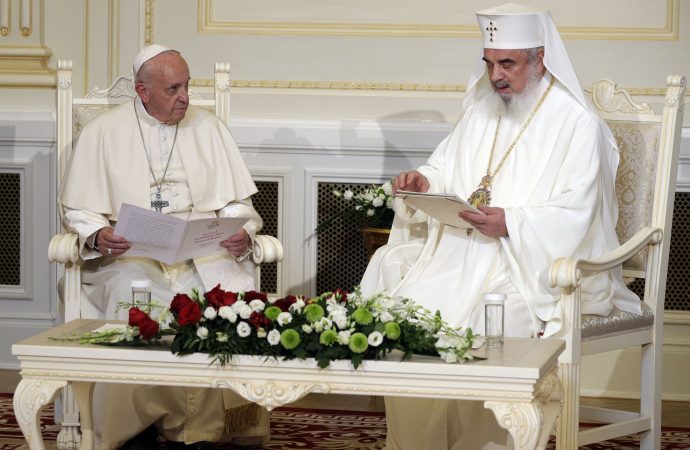Both clad in white in the cream-colored hall of the Patriarchal Palace, Pope Francis and the Orthodox Patriarch of Romania on Friday confirmed their commitment to strengthening relations twenty years after Saint John Paul II’s historic visit to the country.
“We need to help one another not to yield to the seductions of an individualistic ‘culture of hate’ which, perhaps no longer ideological as in the time of the atheist persecution, is nonetheless more persuasive and no less materialist,” Pope Francis said to the Permanent Synod of the Romanian Orthodox Church in Bucharest May 31.
The pope told Orthodox bishops in the country that while technological development has helped many, others “have remained hopelessly excluded.” As globalization grows, he added, traditional values are eroded, and ethics weakened.
As a consequence, Francis said, there has been “growing sense of fear which, often skillfully stoked, leads to attitudes of rejection and hate.”
May 31 to June 2, the pope is making an apostolic visit to the Eastern European country of Romania, which largely identifies as Orthodox. Following decades of totalitarian regimes, both Nazi and Communist, the country has now started to foster economic growth.
In 1999, Saint John Paul II met Orthodox Patriarch Teocist in Romania, with whom he prayed and celebrated a liturgy, sending a powerful message of ecumenism to the region and the world. Building on that legacy, Francis met with Patriarch Daniel and the Orthodox Synod at the Patriarchal palace.
“Our predecessors call us today to defend and promote the faith in Christ’s values and in Christian values in a very secularized Europe, to transmit to future generations the faith in the merciful love of Christ for the world and the eternal faith in the human person,” Patriarch Daniel said in the Conventusroom, a Latin word that aptly means “encounter.”
“At the same time, they call us to confess, defend and promote the traditional Christian family made by man, woman and children, in a Europe that is experiencing an evident demographic decline, a quickly aging continent,” he added.
Both denominations prayed the “Our Father” at the new Orthodox Cathedral in the capital after their meeting, but they did not celebrate Mass in common. Relations among various denominations in Romania are generally peaceful, but tensions remain between the Orthodox and Greek Catholic groups.
“In many cases, a relationship of reciprocal trust and friendship has developed, nurtured by concrete gestures of acceptance, support and solidarity,” Francis said in his speech.
“Through the growth of this reciprocal knowledge, many Catholics and Romanian Orthodox have discovered that they are not strangers, but brothers, sisters and friends,” he added.
As a country that suffered under totalitarian regimes that persecuted religious minorities, especially the local Greek Orthodox community, Romania’s history is marked by a long list of Orthodox and Christian martyrs.
Pope Francis referenced this “ecumenism of blood” during his speech, starting with the “blood brothers” Peter and Andrew who are said to have converted Romania to Christianity.
“They remind us that there exists a fraternity of blood that precedes us and that, as a silent and life-giving stream flowing down the centuries, has never ceased to nourish and sustain us on our journey,” the pope said.
This message is especially important for young people, Francis continued, who having not experienced persecution themselves cannot afford to lose this “precious inheritance.”
“It is a shared inheritance and it summons us to remain close to our brothers and sisters who share it,” he said.
These shared experiences, Francis said, must not be based on “the memory of wrongs endured and inflicted, of judgments and prejudices that enclose us in a vicious circle and bring only barrenness,” but on “the memory of roots.”
“Thank God, our roots are sound and sure, and, even if their growth has undergone the twists and turns of time, we are called,” he said, “to remember with gratitude all that the Lord has done in our midst and to raise to him a song of praise for each other.”

